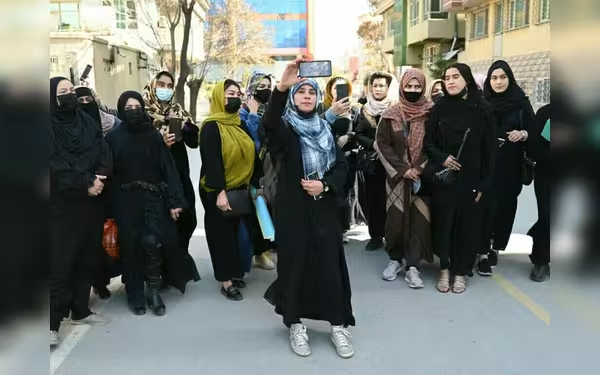Saturday, November 16, 2024 04:35 PM
Taliban Ministry Clarifies Afghan Women's Communication Rights
- Taliban denies ban on women speaking to each other.
- Specific guidelines for women's communication exist.
- International outrage over women's rights in Afghanistan.
 Image Credits: brecorder
Image Credits: brecorderTaliban's Ministry clarifies that Afghan women can speak to each other, amidst ongoing concerns over their rights and freedoms.
In recent weeks, the situation for women in Afghanistan has drawn significant attention, particularly regarding their rights and freedoms under the Taliban government. Following their return to power in 2021, the Taliban has implemented a series of strict regulations that have severely limited women's rights, leading to widespread concerns about gender equality and human rights in the country.
On Saturday, the Taliban's Ministry for the Propagation of Virtue and the Prevention of Vice (PVPV) addressed rumors circulating in the media about a supposed ban on women speaking to one another. The ministry's spokesman, Saiful Islam Khyber, firmly stated, "A woman can talk to another woman; women need to interact with one another in society, women do have their needs." This statement was made in response to reports that suggested women were not allowed to hear each other's voices, a claim that Khyber described as "brainless" and "illogical."
However, the PVPV did clarify that there are specific guidelines under Islamic law that women must follow when communicating, especially during prayer. According to these guidelines, women are encouraged to use hand gestures instead of raising their voices. This reflects the broader restrictions imposed by the Taliban, which include prohibitions on singing or reciting poetry aloud in public. Furthermore, the recent "vice and virtue" law mandates that women’s voices should be "concealed" along with their bodies when they are outside their homes.
The implications of these regulations are profound. Women’s voices have been banned from television and radio broadcasts in certain provinces, further silencing their presence in public life. The United Nations has described the situation as "gender apartheid," highlighting the severe limitations placed on women’s rights, including the prohibition of education after secondary school and restrictions on employment and access to public spaces.
Despite the Taliban's claims that all Afghan citizens' rights are guaranteed under Islamic law, the reality for many women remains grim. The ongoing restrictions have sparked international outrage and concern for the future of women's rights in Afghanistan. As the world watches, it is crucial to continue advocating for the rights of Afghan women, ensuring that their voices are heard and their needs are met.
While the Taliban government may deny certain restrictions, the lived experiences of Afghan women tell a different story. The need for dialogue, education, and empowerment remains critical. As we reflect on these developments, it is essential to support efforts that promote gender equality and human rights, not just in Afghanistan but globally, to ensure that every woman has the opportunity to speak freely and live without fear.













